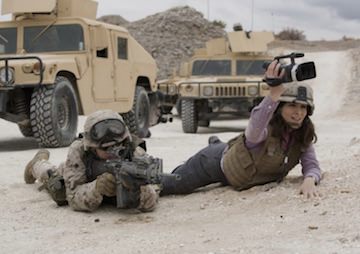‘Whiskey Tango Foxtrot’ Movie Review: A Peek Inside the Bubble of Wartime Kabul
As a reporter facing the horrors and absurdities of the Afghanistan War, Tina Fey is reliably funny and at times profound. IMDb
IMDb
In military jargon, “Whiskey Tango Foxtrot” is code for “What the fuck?” It is also the title of the mordantly funny, R-rated film based on “The Taliban Shuffle: Strange Days in Afghanistan and Pakistan” by Kim Barker, former ProPublica reporter, South Asian bureau chief for the Chicago Tribune and now a New York Times reporter.
One book review of her darkly comic memoir described Barker as a “Tina Fey type,” as the author deftly evoked both the horror of improvised explosive devices and the absurdity of a Pakistani minister’s romantic advances. Whether by coincidence or fate, Fey both produced and stars in this film adaptation from the off-center directing team of Glenn Ficarra and John Requa, the pair behind “Bad Santa” and “Crazy, Stupid, Love.”
Rechristened Kim Baker, Fey’s character is a female counterpart of the adrenaline junkies in “The Hurt Locker,” but with a more pronounced appreciation of the farcical. A cubicle drone at a news network, Kim is tired of producing copy about the effects of fructose on children’s diets. She’s had it up to her eyebrows “writing stuff for dumb, pretty people to read.” So when the network gathers all the unmarried staffers and offers them a chance to be an on-air embed in Kabul, Kim signs on with the resigned air of one who thinks it couldn’t get any worse.
Like so many women in films by men, Kim is clueless and klutzy, so her reportorial competence comes as a surprise. Because she is played by Fey, whose default expression is side-eye, and because the screenplay is by Robert Carlock, who also wrote Fey’s TV show, “30 Rock,” at times the effect is that of Liz Lemon goes to Kabul.
Still, the movie takes the audience inside the airless “Ka-bubble,” the terrarium world where the Taliban, Afghan natives, war correspondents and different branches of the American military huddle cheek by jowl. Correspondents like Kim compete with Tanya Vanderpoel (played by Margot Robbie as a Lara Logan-like TV reporter) for the hot story while Marines and soldiers compete to get reporters to frame them as heroes. At the same time, Taliban numbers are on the rise and U.S. interest in Afghanistan on the wane as American attention shifts to Iraq and Pakistan.
From the Afghan minister of propaganda (Alfred Molina) to Gen. Hollanek (Billy Bob Thornton) to Kim herself, the objectives are murky and ethical lines even murkier. What distinguishes this war movie from many others is that there are no clear good or bad guys, only humans in an inhuman situation.
Pressure is high; need for release is urgent, and delivery systems are sex and booze. The journalists live in a kind of frat house where both are plentiful, even though they provoke disapproval from the Afghan natives, especially Kim’s translator, Fahim (Christopher Abbott). (In this era of inclusion, it is odd that the British Molina and American Abbott, excellent actors both, play Southwest Asians.)
While Kim does fall into bed with an obnoxious reporter (humorously played by Martin Freeman), it is her chaste intimacy with two other men whose lives she puts at risk that has far more resonance. One is Fahim, a former doctor making more money as a translator, who explains her growing addiction to adrenaline.
It is, perhaps, her respect for Fahim and his religious customs that influences Kim to explore the concept of female modesty, symbolized by the burqa, even as she makes fun of it. In an unusually lyrical passage, Kim dons one and peeks out at the men eyeing her mysterious, flowing garment with great interest.
The other is Spc. Coughlin (Evan Jonigheit), an outgoing Marine she meets on her first day as an embed and sees again toward the end of the film. Outside the terrarium, they can see Afghanistan more clearly than when inside. Her tender conversations with, and leave-taking from, each man elevates this black comedy into something close to profound.
Your support matters…Independent journalism is under threat and overshadowed by heavily funded mainstream media.
You can help level the playing field. Become a member.
Your tax-deductible contribution keeps us digging beneath the headlines to give you thought-provoking, investigative reporting and analysis that unearths what's really happening- without compromise.
Give today to support our courageous, independent journalists.






You need to be a supporter to comment.
There are currently no responses to this article.
Be the first to respond.